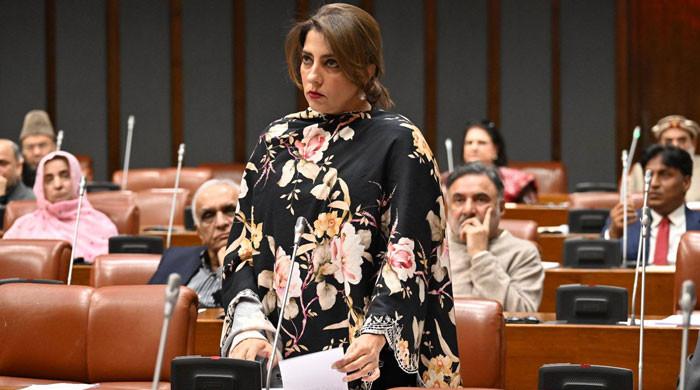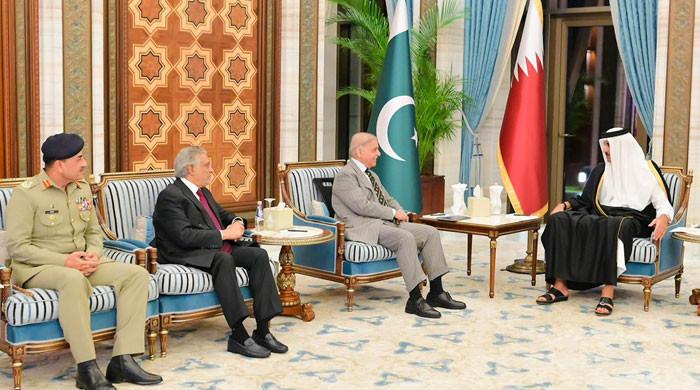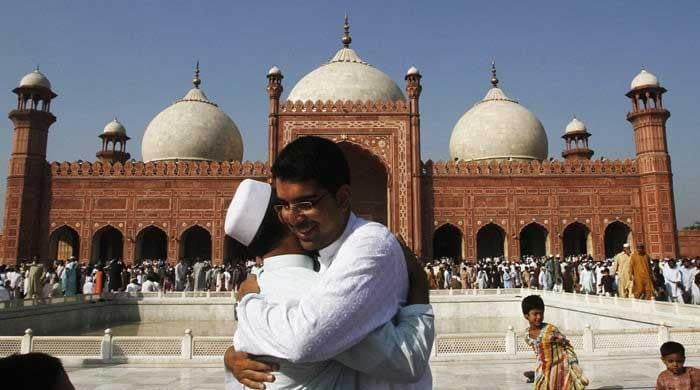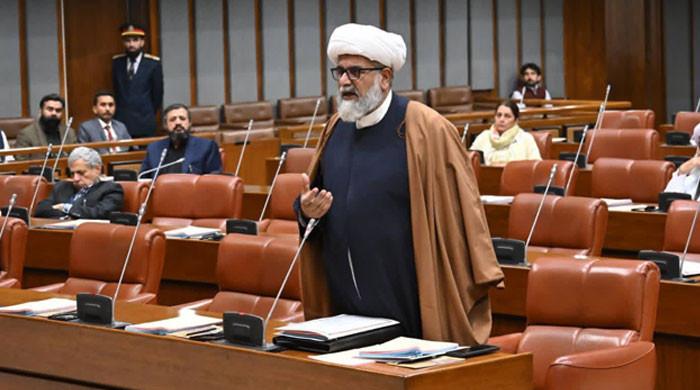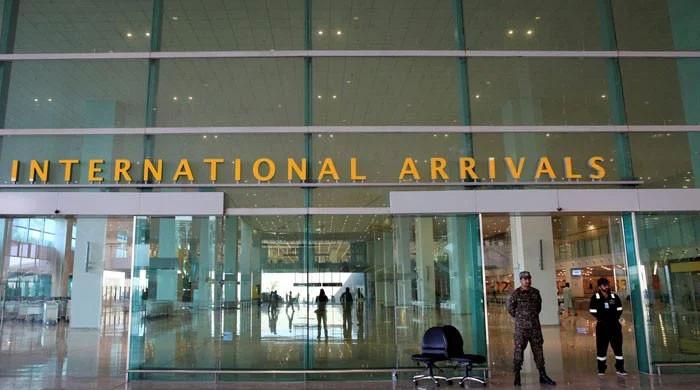'Huge, historic': Experts hail Pakistan's defence pact with Saudi Arabia
Saudi Arabia and Pakistan have signed a formal mutual defence pact, a major step towards boosting already strong ties
September 18, 2025
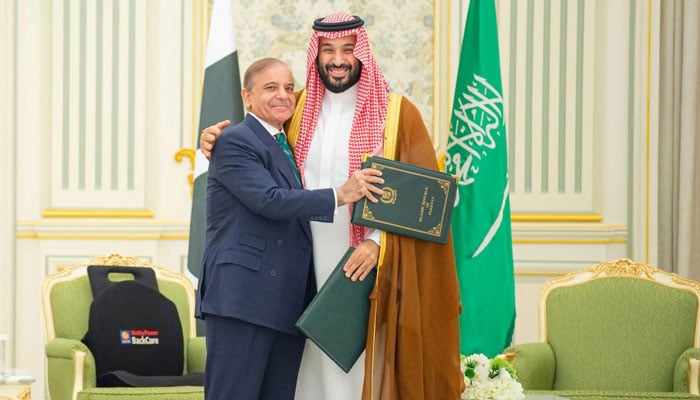
Saudi Arabia and Pakistan on Wednesday signed a formal mutual defence pact, a move that significantly strengthens a decades-long security partnership.
"This agreement, which reflects the shared commitment of both nations to enhance their security and to achieve security and peace in the region and the world, aims to develop aspects of defence cooperation between the two countries and strengthen joint deterrence against any aggression. The agreement states that any aggression against either country shall be considered an aggression against both," a statement from the prime minister's office said.
Experts have hailed the agreement, which came days after Israel launched a strike against Qatar, targeting Hamas leaders in Doha, a move that sparked outrage among Muslim nations and world leaders alike.
'Strategic win'
Senior journalist Hamid Mir noted that the joint statement shows that this agreement holds significance. This agreement, keeping in view the situation in the Middle East, shows that Pakistan has emerged as a new power that can work with not only Middle Eastern nations, but South Asians, to safeguard them against India and Israel, he said.
“Two more nations are expected to sign similar agreements with Pakistan,” the journalist noted. The latest situation, he explained, shows that even American bases are not safe from Israel. He said that this is a major political shift.
“Before, there was a perception that America stands by its allies, but that’s not the case anymore after Donald Trump. Israel has also attacked American allies.”
Mir added that Pakistan and Saudi Arabia’s agreement has no direct relations with the US, but it is against Israel, a friend of Pakistan’s arch-rival India. “This is also a strategic win for Pakistan, but at the same time, a challenge for Pakistan to live up to Saudi Arabia’s expectations.”
'Historic'
Senior anchorperson Shahzad Iqbal told Geo News that the signing of the pact was “huge”, noting that despite close ties between the two, the agreement that any act of aggression on one is an act of aggression on the other is historic.
Both Pakistan and Saudi Arabia have taken action after Israel’s actions against Qatar, he said, hoping that more countries could sign agreements with Islamabad. “Pakistan has also earlier made it clear that it would not bear any aggression against India, come what may.”
Pakistan also holds importance as a nuclear nation, he noted. Iqbal added that Pakistan also needs to secure its borders with Afghanistan and added that the country’s partners should also see how they can help Islamabad in this regard.
Pakistan's 'supremacy'
International relations expert Huma Baqai told Geo.tv that it’s an interesting development, which will have a long-term impact on the power matrix of both South Asia and the Middle East.
“The obvious dimension is Saudi Arabia not relying only on the US security umbrella, and going into a defence pact with Pakistan, but a deeper dive perhaps is needed. The 11-hour war established Pakistan and China’s supremacy, and had probably triggered this.”
“For now, it can be seen as a positive development, which will definitely have a ripple effect on the country’s economy. This development is indicative of a changing global order and new alliances in the making. It may also result in a domino effect of more Gulf and Arab states seeking such alliances.”
'Most reliable partner'
Defence analyst Sohail Muhammad Ali has termed the agreement a “historic development,” describing it as the most significant defence pact in Pakistan’s history.
He noted that while Pakistan has previously been part of US-led pacts and alliances, the new agreement stands out for its binding clause that treats any aggression against either country as an attack on both.
Ali said the accord carries historic importance not only for Pakistan but also for South Asia and the broader Islamic world.
Highlighting its significance, he pointed to three key aspects: the current global environment marked by unilateral aggression, violations of international law, and infringements on state sovereignty.
He added that the pact, signed just two days after an extraordinary meeting in Doha, reflects international recognition of Pakistan’s defence capability under Army Chief General Asim Munir’s leadership, particularly in the wake of Pakistan’s recent victory against India.
According to Ali, the agreement affirms Saudi Arabia’s confidence in Pakistan as its most reliable partner and acknowledges Pakistan as the most capable Muslim power to promote peace and stability across South Asia and the Middle East. He said the accord effectively translates the Pakistan–Saudi relationship into a formal security commitment.
'Major'
Meanwhile, Anchorperson Shahzeb Khanzada has described the agreement between Pakistan and Saudi Arabia as a “major development,” stressing that the language of the joint statement carries critical significance.
He noted that while Pakistan has long pledged to play its role in ensuring Saudi Arabia’s security, the inclusion of the clause on mutual deterrence — declaring any aggression against one country as aggression against both — adds new weight to the relationship.
Khanzada said the statement effectively means that if Pakistan faces aggression, including from India, Saudi Arabia will stand by it.
He linked the development to recent regional events, including the Doha summit and Israeli strikes, which, he argued, accelerated the urgency for Arab countries to consider joint defence measures.
Referring to remarks by Defence Minister Khawaja Asif on his show, Khanzada said Arab states increasingly believe Israel may not halt its aggression, prompting the need for a coordinated security plan.
‘New security mindset'
Former ambassador Aizaz Chaudhry has termed it a “major breakthrough,” saying it reflects a new security mindset in the Arab world following Israeli aggression in the region.
He said the accord came in the wake of the Israeli strike on Qatar and the subsequent Doha summit, which left Arab states deeply concerned about regional security. “If Qatar can be attacked, others can be as well,” Chaudhry remarked, adding that Israeli Prime Minister Netanyahu’s vision of a “greater Israel” has heightened regional unease.
Against this backdrop, Chaudhry noted, Saudi Arabia turned to its “most sincere friend,” Pakistan, which has historically supported the Kingdom. He stressed that while defence cooperation has existed before, the clause declaring any aggression against one country as aggression against both marks an unprecedented step in bilateral ties.
Chaudhry further said that after Marka-e-Haq, regional perceptions of Pakistan shifted significantly, with many countries now viewing it as the strongest power in the region.
'Deterrence'
Foreign affairs expert Prof Dr Nausheen Wasi said the new defence pact must be seen in the context of shifting regional dynamics.
“After Israel’s attack on Qatar, the possibility of strikes on other countries has grown.” She added that Pakistan-Saudi defence cooperation represents a close strategic partnership.
“This pact is essentially about deterrence, as Pakistan’s nuclear capability strengthens its position in the region,” Dr Wasi said.




